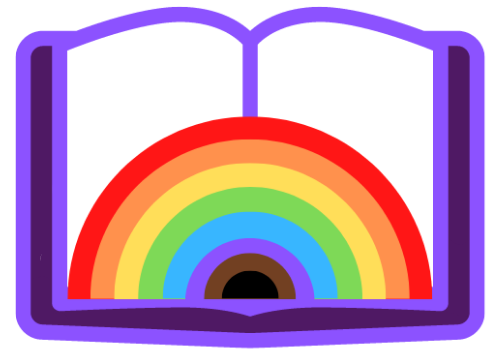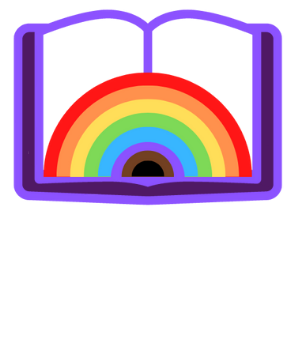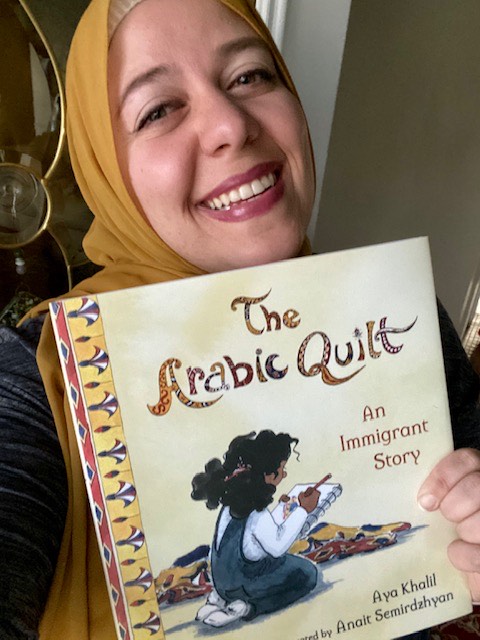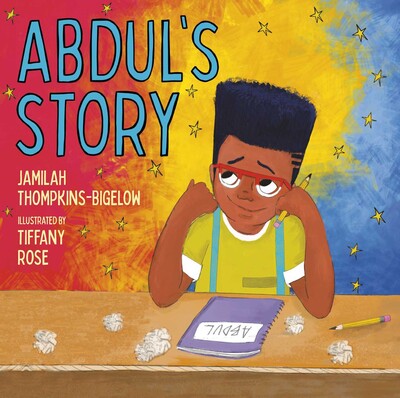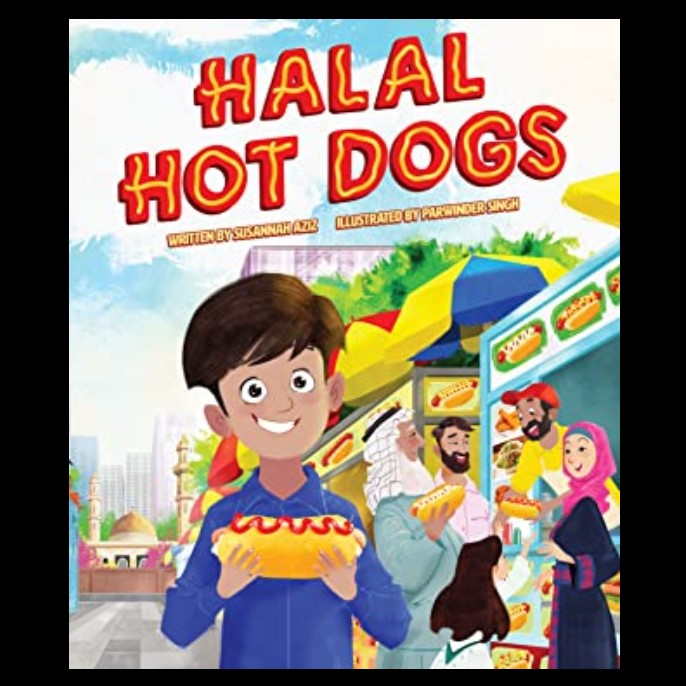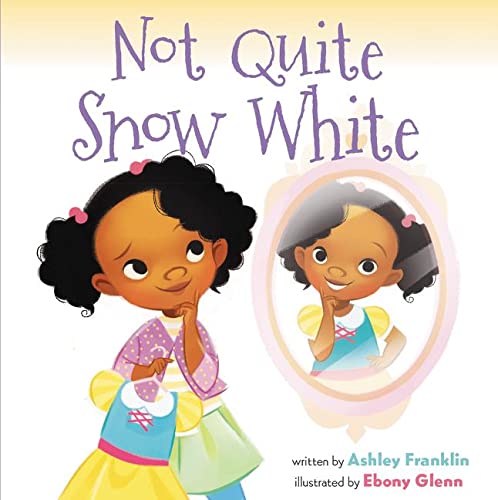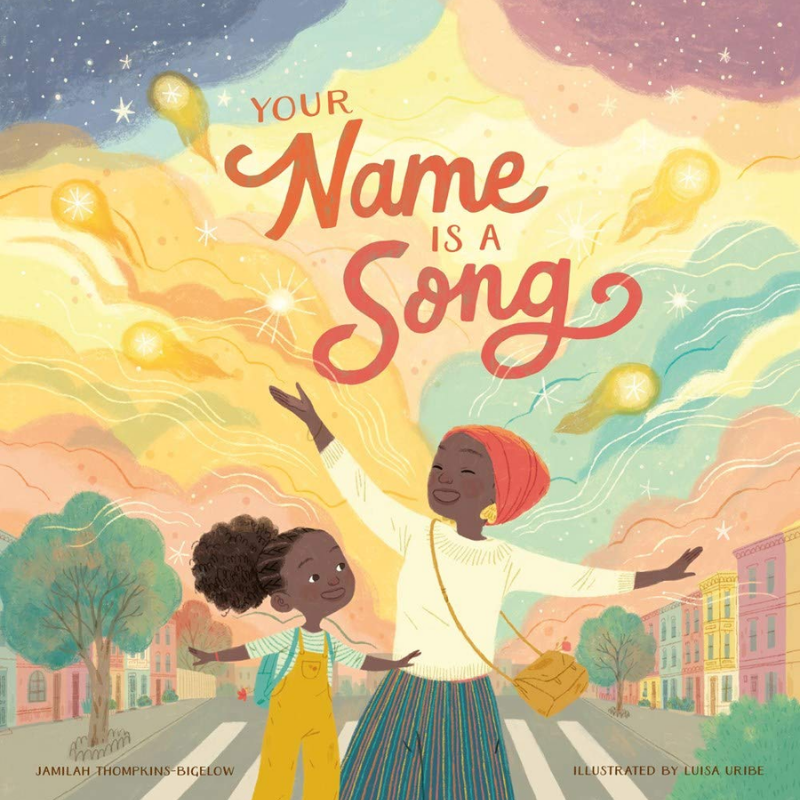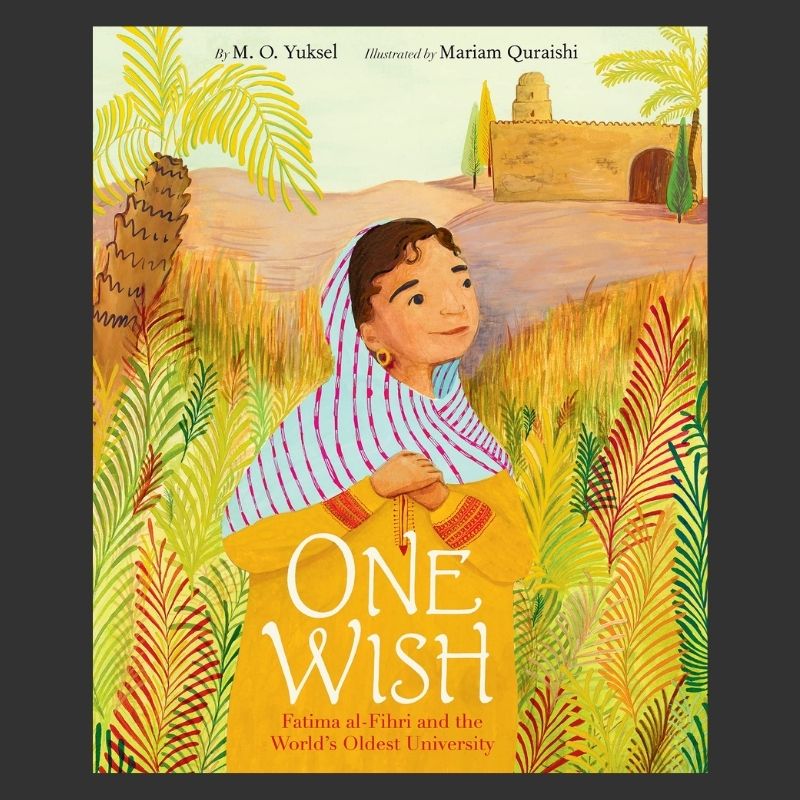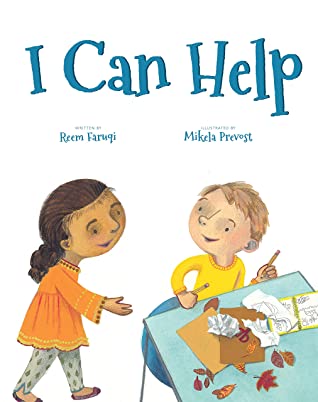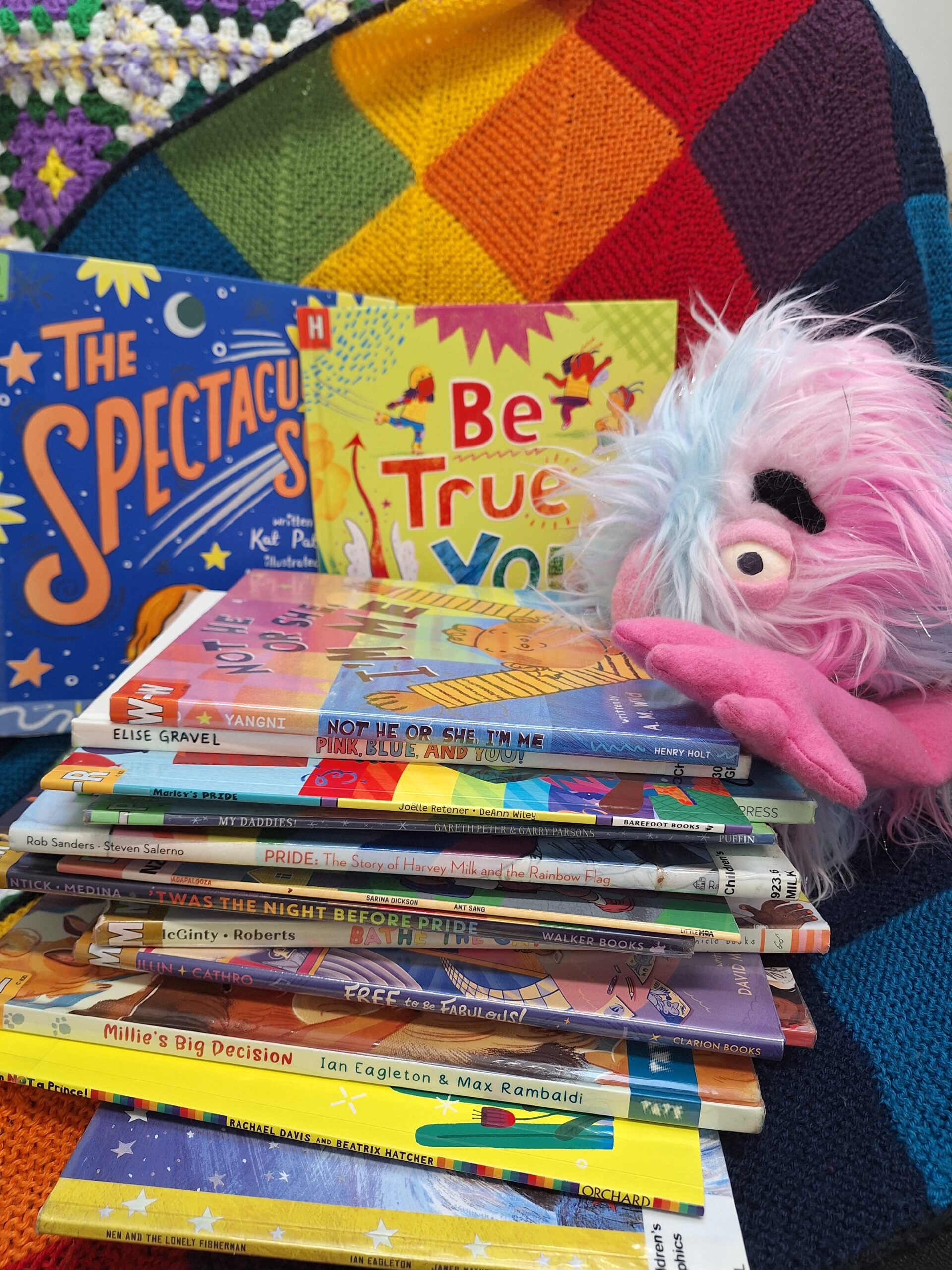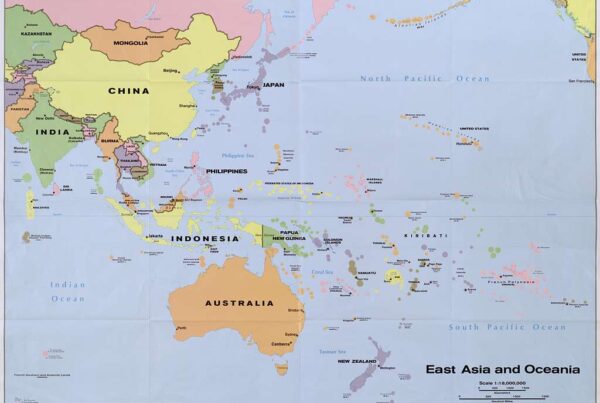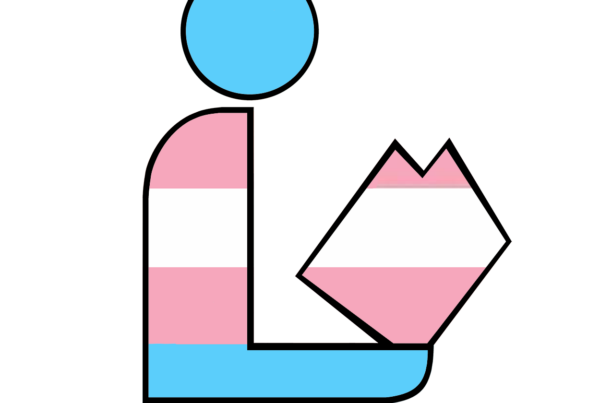

Reading your book, it breaks our hearts that it was banned. Did you expect the backlash?
When I was writing THE ARABIC QUILT, there was one line that stood out in the manuscript that I thought might cause some controversy. That line was: “You can still speak non-English languages and still be American.” I thought that some people might not like it, because as we have seen throughout history in our country that having a foreign accent, especially an accent from Arab countries, is looked down on and people with accents are often discriminated against. But I didn’t think it would be on an actual banned books list.

You have a very exciting upcoming book, THE BANNED-BOOKS BAKE SALE. Was this inspired by the issues you faced with THE ARABIC QUILT?
Yes, I am so excited about this book. It’s definitely based on true events, like how diverse books were banned in a district in Pennsylvania, and then the brave students at the district stood up and raised funds to buy more diverse books. THE ARABIC QUILT was on that banned books list and so when I had the opportunity to write another book for the publisher, Tilbury House, I kept thinking about the banned books, and protests, and the power of children’s voices. So the words started to flow. I checked out a few books from the library about protesting and social justice but I didn’t find any books ABOUT banned books. Also, I wanted to somehow link it to the Egyptian revolution of 2011 because it’s something that I often think about: the power of uniting together against injustice. I was ecstatic to hear that Anait (the illustrator of THE ARABIC QUILT would be illustrating it [the new book] so we used the same characters. The grandma (teita) shares her stories from the Egyptian revolution and it really encourages Kanzi to use her voice, with the help of her classmates and supportive teacher and librarians.

This is our first Ramadan since we created Storytime Solidarity. We’d like to be supportive of our Muslim friends. Is there anything you wish everyone knew about Ramadan?
If readers work at schools, my friend Huda and I created this free poster about accommodations that’s gotten a lot of attention. Even for parents and families who don’t observe Ramadan, it’s helpful for schools and administrations to have it to support Muslim students.
I think just being more patient with Muslim friends as they focus on the spiritual aspect of the month. But for the most part, we still go to work and school.
We also appreciate acknowledgments like “Happy Ramadan” or “Ramadan Kareem,” and “is there anything we can do to support you this month?”

A lot of us would like to be allies and support our Muslim friends and colleagues. Do you have any advice? Anything you want us to avoid?
A big thing that Muslims do is pray five times a day and sometimes prayer times fall during the day at work and school. It’s AMAZING when employers AND schools offer a private space for prayers — an empty room or quiet space, even just for a few minutes.
I would also avoid asking Muslim co-workers personal things like, “Why do you wear hijab?” or questions like, “Where are you from?” because these are micro-aggressions and we just want to work in peace!
It’s different though if you have a close relationship with a co-worker or friend and the conversation comes up.

You mention that when non-Muslims don’t eat in front of a Muslim coworker during Ramadan as a form of respect or when a meat-eater avoids eating a big, juicy steak when she goes out with her vegetarian friend. What else can we do to show solidarity during Ramadan — and the rest of the year?
Just being mindful that your friends can’t really join you for coffee and lunch breaks. And if they are eating during Ramadan, don’t question it either 🙂 because there are many reasons Muslims don’t fast in Ramadan (see free poster above).
For most of us though, it’s really OK to eat in front of fastings Muslims, but we appreciate that you still think about it.

What do you hope those little readers who are struggling to adapt to a new country and its customs learn from your immigrant story?
That they BELONG and MATTER. Their stories are important and we want them to hold on to their immigrant stories, their culture, language, and food… and embrace it all.

The quilt is a universal symbol for bond/unification through colors, pictures, and representation of one’s life. What do you think is another universal symbol children could use to bridge that cultural gap?
I think light is a big thing also because it’s so universal. For example, many holidays have lights to symbolize peace, brightness, and calmness. Whether it’s a candle, lights, or lanterns (fanoos).

It was wonderful to see at the end of the story that Kanzi saw another class use the quilt idea to write their names in Japanese. What an inspiring final note. Where did you get this idea?
The original quilt idea was actually based on a true story when my third grade teacher asked me to write my classmates’ names in Arabic. The class created a quilt just like in the story. My best friend is Japanese so I wanted to somehow incorporate that in the end. Plus the fact that learning and appreciating different languages is a path to making new friends.

To have Molly ask Kanzi to write her mom’s name in Arabic after she made the comment that her mom said “living in America means you speak English” was a turning point to the bullying Kanzi was going through. What did it mean to you to show this conflict and then the resolution between Kanzi and her classmate Molly?
I think kids usually just say what they hear from their families unfortunately. So it was obvious that Molly’s mom was a bit of a bigot. But the teacher here plays such an important role to create an inclusive environment and change these incorrect views. I like to think that Kanzi learned from her teacher those next few days and also maybe had a talk with her mom about these unfortunate views.

You have a lot of projects on the go, can you tell us what to look out for next?
I just announced a new board book I wrote, illustrated by Magda Azab and published by Barefoot Books called OUR WORLD: EGYPT. Also, THE NIGHT BEFORE EID comes out next March and I can’t wait for everyone to see the cover soon, illustrated by Rashin and published by Little, Brown. And I have a few books out for submission so fingers crossed those worked out.

Can you recommend a few other picture books our readers might enjoy?
Currently I love:
ONE WISH: FATIMA AL-FIHRI AND THE WORLD’S OLDEST UNIVERSITY (Affiliate link)
Words by
ZAHRA’S BLESSING (Affiliate link)
Words by
ABDUL’S STORY (Affiliate Link)
Words by
Some of my all-time favorite Picture Books!
Words by Reem Faruqi and Illustrated Mikela Prevost
HALAL HOT DOGS (Affiliate Link)
Words by Susannah Aziz and Illustrated by Parwinder Singh
YOUR NAME IS A SONG (Affiliate link)
Words by Jamilah Thompkins-Bigelow and Illustrated by Luisa Uribe
A note from Miss Kate:
On behalf of the entire Storytime Solidarity team, I’d like to thank Aya Khalil for generously answering so many of our questions! Her beautiful book is as personal as it is universal and I appreciate so much that she took the time to speak with us and share her story. We hope that you’ll support her, and all the authors we feature, in whatever small way you can.
You may notice that we’ve begun including affiliate links. We feel this is a way to support authors — we’d love it if you bought their books for yourself and your libraries — and if you use the links we’ve provided you’ll also be helping support this website. We currently have no operations budget so any support, including purchasing through these links, helps us a great deal.
